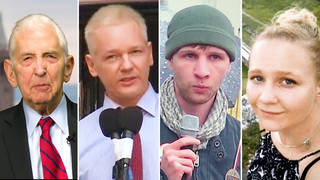
Related
By Amy Goodman & Denis Moynihan
“What a dangerous edifice War is, how easily it may fall to pieces and bury us in its ruins,” wrote Carl von Clausewitz, the 19th-century Prussian general and military theorist, in his seminal text “On War,” close to 200 years ago.
These lines came from the chapter “Information in War,” a topic that resonates today, from Fort Meade, Md., where Pfc. Bradley Manning has just been convicted of espionage in a military court, to the Ecuadorean Embassy in London, where WikiLeaks founder Julian Assange has lived for more than a year, having been granted political asylum to avoid political persecution by the United States, to Russia, where National Security Agency whistle-blower Edward Snowden has been granted temporary asylum.
Manning’s conviction sparked momentary interest among members of the elite media in the U.S., who spent scant time at the two-month court- martial, located just miles north of Washington, D.C. Manning’s supporters expressed relief that he was found not guilty of the most serious charge, aiding the enemy, which would likely have carried a sentence of life in prison. He was convicted on 20 of 22 charges, and could face up to 136 years in prison. The sentencing hearing is underway.
“Bradley Manning’s alleged disclosures have exposed war crimes, sparked revolutions and induced democratic reforms,” Assange said from the embassy. “He is the quintessential whistle-blower.”
Interestingly, former Defense Secretary Robert Gates wrote about the leaks to Sen. Carl Levin in 2010, saying, “The review to date has not revealed any sensitive intelligence sources and methods compromised by this disclosure.”
Manning made a statement at the start of the court-martial, wherein he took responsibility for the leaks, but, importantly, expressed his motivation. He commented specifically on the Apache attack helicopter video that recorded the slaughter of a dozen civilians in Baghdad on July 12, 2007. Two of those killed worked for the Reuters news agency, cameraman Namir Noor-Eldeen, 22, and his driver, Saeed Chmagh, a father of four.
We can listen to Manning in his own words, thanks to an unauthorized audio recording of his statement, anonymously leaked. He said: “The most alarming aspect of the video to me was the seemly delightful blood-lust the aerial weapons team seemed to have. They dehumanized the individuals they were engaging and seemed to not value human life, and referred to them as quote-unquote ‘dead bastards,’ and congratulated each other on their ability to kill in large numbers. … For me, this seemed similar to a child torturing ants with a magnifying glass.”
One of the charges for which Manning was found guilty was “wanton publication.” It’s unprecedented in military law. Manning’s lawyer called it a made-up offense. The real offense, for which no one has been charged, is the wanton disregard for human life that Manning exposed.
Manning’s leak gave Reuters, and the world, a graphic view of the horror of modern war, of the violent death of two media workers in the line of duty.
As the young soldier also said in his eloquent statement, “I believed that if the general public, especially the American public, had access to the information contained [in the leaks], it could spark a domestic debate on the role of the military and our foreign policy in general as it related to Iraq and Afghanistan.”
Indeed, he did spark such a debate. The latest wave of disclosures, from Edward Snowden, has only intensified the debate, with a rare bipartisan coalition in Congress growing to clamp down on what many see as a runaway national-security state. While a legislative amendment by Republican Justin Amash and Democrat John Conyers in the U.S. House of Representatives was narrowly defeated last week, the two have authored a stand-alone bill, H.R. 2399, that will do the same.
Carl von Clausewitz wrote, “The great uncertainty of all data in War is a peculiar difficulty, because all action must, to a certain extent, be planned in a mere twilight.” Manning took incredibly courageous actions to release data, to pierce the fog of war, to make public the machinations of modern American war-making. Edward Snowden has exposed the sophistication and extraordinary reach of the U.S. surveillance state, cracking down on those who would dare to release information. And Julian Assange sits within the four walls of his embassy redoubt, persecuted for the crime of publishing. Yet those who planned the wars, those who committed war crimes, those who conduct illegal spying, for now, walk free.
Amy Goodman is the host of “Democracy Now!,” a daily international TV/radio news hour airing on more than 1,200 stations in North America. She is the co-author of “The Silenced Majority,” a New York Times best-seller.
© 2013 Amy Goodman











Media Options